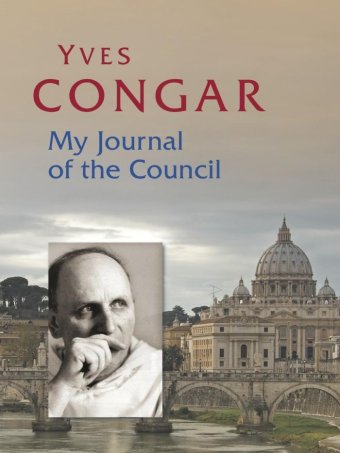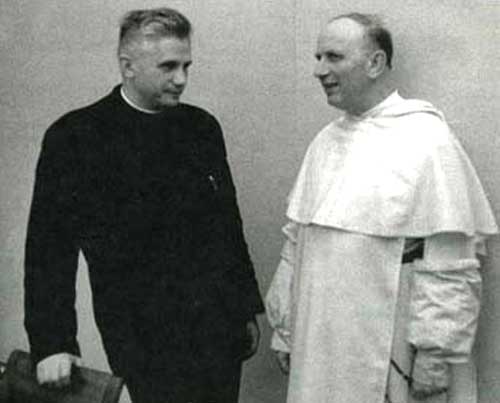My Journal of the Council
by Yves Congar
Liturgical Press, 1,100 pages, hardcover
Yves Congar is widely hailed as a top Catholic thinker, but it wasn’t always so. In the 1950’s, along with Henri de Lubac and Karl Rahner, Congar was censured for what were perceived to be ‘progressive’ ideas. The Church’s fog of suspicion hung over his work for almost a decade, and he was shunned by many fellow theologians.
However in 1960, Congar was redeemed. Pope John XXIII personally invited him to attend the Second Vatican Council as a consultor, which Congar humbly accepted. He brought his prodigious expertise to the gathering in areas like Tradition, the laity, ecumenism, and ecclesiology. His impact was evident throughout all the conciliar documents, including Lumen Gentium (especially sections 9, 13, 16, and 17) and the Declaration on Non-Christian Religions (says Congar, “I worked on this; the introduction and conclusion are very nearly mine.”)
John O’Malley, author of What Happened at Vatican II (Belknap, 2008), considers Congar “the council’s single most important theologian”. Joseph Komonchak, editor of the English version of The History of Vatican II (Orbis, 1996), calls him its “most influential.”
 So what a gift it is that such a pivotal figure recorded his personal thoughts, each day throughout the council, and left them for us.
So what a gift it is that such a pivotal figure recorded his personal thoughts, each day throughout the council, and left them for us.
My Journal of the Council (Liturgical Press, 1,100 pages, hardcover) may seem intimidating at first glance. It spans half a decade and is written by a top-notch academic. But once you begin reading, you quickly discover how simple and direct Congar’s language is. In part, that’s because he wrote his entries at the end of long, stressful days. That gives us Congar’s immediate reactions to the council without pretense or flair. It also makes for a much easier read, stripped of theological jargon that would cause non-theologians to stumble.
Many themes emerge throughout the book, but one of the most evident is Congar’s frustration with the council.The deliberations alternated between moving too slow for his tastes, or in the wrong direction. Bishops lectured on obscure, pet topics for hours on end and Congar was not shy about his annoyance. For instance, he described three different men as “an idiot”, “an imbecile”, and someone “who understands nothing.” During one debate over the role of the Blessed Virgin Mary, Congar poked fun at a zealous priest:
“Fr. Balic, alas, had the floor. He made a voluble sales-pitch. I leaned toward my neighbor, Mgr. Philips, and asked him: is he selling braces or socks? Fr. Balic is pure passion.”
Another constant thread is Congar’s remarkable humility. Near the end of the journal, he reflects on his overall impact, saying, “I feel crushed by the consciousness of the mediocrity of my life and work.” He refused praise and consistently redirected it toward God. An entry from November 13, 1965 is typical:
“A brief interchange with Mgr. Hofer: ‘You are winning all along the line’ he told me. That has often been said to me, but, as far as I am concerned, it is not that in any degree or manner. I know myself to be so unequal to the task of which I have been called, by pure grace. But however badly I have fulfilled it, I am profoundly happy to have been able, among others, to serve two things that are so dear to me: the Missions and priests. In this (and other ways) I feel myself very much in communion with little Therese and with Tere [Congar’s mother].”
As can be expected, My Journal of the Council also touches upon many of the council’s great controversies. Collegiality was one dearest to Congar’s heart. At the time of Vatican II, Congar was wary of the Church’s increasing centralization, both theologically and practically. The First Vatican Council formally defined papal infallibility, much to the frustration of another long-suffering theologian, Cardinal John Henry Newman. Like Newman, Congar felt this emphasis threatened the collegial authority shared by all the world’s bishops.
In Congar’s mind, the council never fully addressed this concern, even to the end. In fact he chose not to attend the council’s closing events, choosing to watch them on television because of the pomp and pageantry which reinforced this error:
“This morning I did not go to the final ceremony in St. Peter’s Square….From the ecclesiological and ecumenical point of view, the Pope got all the attention. He sat enthroned as a sovereign; everything had reference to him. He did not appear to be so much in the Church as above it.”
Overall, My Journal of the Council delivers a rare glimpse into the towering figures, frustrating disputes, historic pronouncements, and daily grind of the twentieth-century’s most important religious event. And by journeying alongside one of its most central figures, you’ll experience all the difficulties, thrills, and adventures yourself.
This was written as part of the Patheos Book Club, where Congar’s journal is featured this month. Stop by for an excerpt and other reviews.

